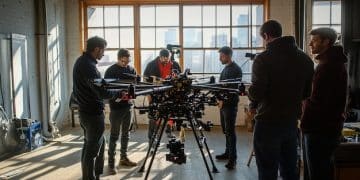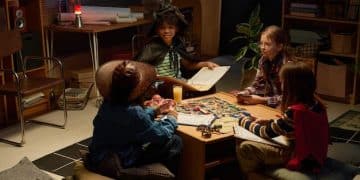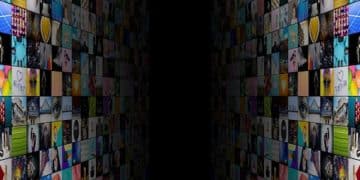The Unseen Drama: Reality TV Editing Room Secrets Revealed
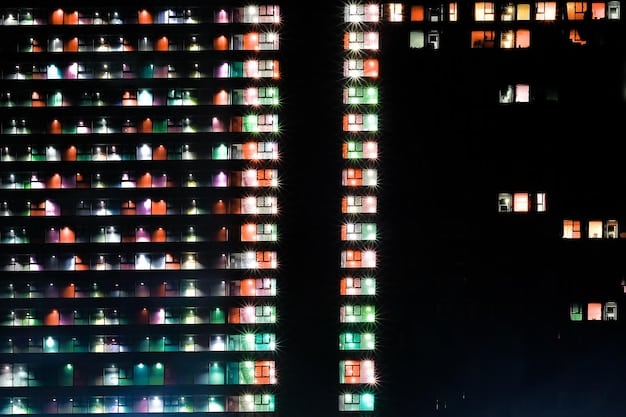
Reality TV editing rooms are where the real drama unfolds, as editors meticulously craft narratives from hours of raw footage, shaping perceptions and creating compelling stories.
Ever wondered what really goes on behind the scenes of your favorite reality TV shows? The **unseen drama: insider secrets from reality TV editing rooms revealed** promises an intimate look at the magic and manipulation that shapes our viewing experience.
The Power of the Edit: Crafting Reality
The editing process is where reality TV truly takes shape. It’s more than just cutting and pasting clips together; it’s about crafting a narrative, building tension, and creating characters that viewers will either love or hate.
Editors are the unsung heroes (or villains) of reality TV. They wield immense power to shape the story, influence audience perception, and ultimately, determine the success of a show.
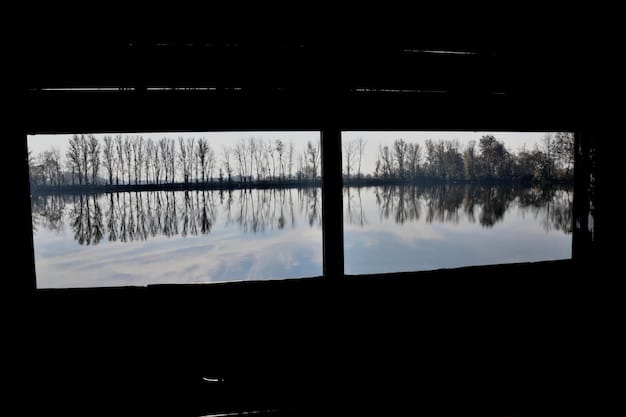
Selecting the “Best” Moments
One of the primary tasks of a reality TV editor is sifting through countless hours of footage to find the most compelling moments. This involves identifying key interactions, emotional outbursts, and dramatic events that will resonate with viewers.
Editors are trained to look for specific cues – facial expressions, body language, and vocal inflections – that signal heightened emotions or significant plot developments. These moments are carefully selected and pieced together to create a dramatic narrative.
- Emotional Peaks: Identifying moments of high emotion, such as arguments, tears, or declarations of love, to create viewer engagement.
- Conflict Points: Highlighting conflicts and disagreements between cast members to build tension and drive the storyline.
- Character Arcs: Showcasing the evolution of characters, whether it’s a transformation, a downfall, or a moment of triumph.
The editor’s choices can dramatically alter the way viewers perceive the events and the people involved. What appears to be spontaneous and genuine on screen is often the result of careful selection and arrangement.
The Art of Manipulation: Twisting the Narrative
While reality TV claims to depict real life, it’s no secret that the editing process often involves manipulation. This can range from subtle tweaks to blatant distortions of the truth, all in the name of entertainment.
Editors employ various techniques to manipulate the narrative, including selective editing, rearranging events, and adding music and sound effects to create a desired mood.
Selective Editing: What You Don’t See
Selective editing is the process of choosing which footage to include and which to exclude. This allows editors to create a biased view of events, highlighting certain aspects while downplaying or ignoring others.
For example, an editor might choose to focus on the negative interactions between two contestants, while omitting the positive moments they shared. This can create the impression that the two are constantly at odds, even if the reality is more nuanced.
- Cherry-Picking Quotes: Using only specific parts of a conversation to change the overall meaning.
- Cutting Context: Removing background information that might provide a different perspective on an event.
- Controlling Pacing: Manipulating the speed of scenes to either heighten tension or gloss over less interesting moments.
Rearranging Time: Playing with Chronology
Another common editing technique is rearranging the order in which events occurred. This can be used to create suspense, build anticipation, or even rewrite history.
For example, an editor might choose to show the aftermath of an argument before showing the argument itself, creating a sense of mystery and intrigue. Or they might combine footage from different days to create the illusion of a single, continuous event.

By manipulating the timeline, editors can create a distorted version of reality that is more dramatic and engaging.
Sound and Fury: Adding Emotional Layers
The auditory elements of reality TV – music, sound effects, and voiceovers – play a crucial role in shaping the viewer’s emotional response. These elements are carefully crafted to enhance the drama and create a specific mood.
Music is often used to underscore emotional moments, signaling to the viewer how they should feel. A soaring orchestral score might accompany a romantic scene, while a dissonant chord might herald an argument.
- Heightening Tension: Using suspenseful music and sound effects to create a sense of unease or anticipation.
- Emphasizing Drama: Adding dramatic sound effects, such as crashes or screams, to amplify conflict.
- Guiding Emotion: Employing music to manipulate emotional responses, making viewers feel happy, sad, or angry at the editor’s direction.
Voiceovers are another powerful tool for shaping the narrative. A well-placed voiceover can provide context, offer commentary, or even contradict what is being shown on screen, adding another layer of complexity to the story.
Ultimately, the sound and fury of reality TV is designed to manipulate the viewer’s emotions and keep them hooked.
The Ethics of Editing: Truth vs. Entertainment
The extensive manipulation that often occurs in reality TV editing raises ethical questions about the balance between truth and entertainment. Is it acceptable to distort reality in the name of creating a compelling show?
Many argue that reality TV is inherently unethical because it deceives viewers into believing they are seeing real life, when in fact they are seeing a carefully constructed and often misleading narrative.
Impact on Participants
The editing process can have a significant impact on the participants of reality TV shows. Contestants may find themselves portrayed in a negative light, even if that is not an accurate reflection of their personality or behavior.
This can lead to online harassment, social stigma, and even mental health issues. Some contestants have reported feeling exploited and betrayed by the editing process.
Reality TV producers have a responsibility to protect the well-being of their participants and to ensure that the editing process is fair and ethical.
Transparency and Disclosure
One way to address the ethical concerns surrounding reality TV editing is to increase transparency and disclosure. Producers could be more upfront about the extent to which the show is edited and manipulated.
This could involve including disclaimers at the beginning of each episode, or even providing behind-the-scenes footage that shows the editing process in action.
By being more transparent about the manipulation involved, producers can empower viewers to make their own informed judgments about the reality TV they are watching.
Editors walk a fine line between creating engaging content and misrepresenting people’s lives. The pursuit of entertainment should not come at the expense of ethical storytelling.
The Editor’s Perspective: Challenges and Responsibilities
Reality TV editors face unique challenges and responsibilities. They must balance the demands of producers, the expectations of viewers, and their own ethical considerations.
The job can be demanding and stressful, requiring long hours and intense focus. Editors often work under tight deadlines and must be able to make quick decisions under pressure.
Maintaining Objectivity
One of the biggest challenges for reality TV editors is maintaining objectivity. It’s easy to become emotionally invested in the stories they are telling, which can cloud their judgment.
Editors must strive to be impartial and to avoid letting their personal biases influence their decisions. This requires a high degree of self-awareness and a commitment to ethical storytelling.
- Recognizing Bias: Identifying personal biases and how they may affect editing choices.
- Seeking Feedback: Getting input from others to ensure a balanced perspective.
- Focusing on Facts: Prioritizing accurate representation over sensationalism.
The Future of Reality TV Editing
As technology continues to evolve, the future of reality TV editing is likely to be shaped by new tools and techniques. Artificial intelligence (AI) is already being used to automate some of the more tedious aspects of the editing process.
AI-powered editing software can automatically identify key moments, suggest cuts, and even generate entire scenes. This could potentially free up editors to focus on more creative and strategic tasks.
However, it’s important to ensure that AI is used responsibly and ethically. The human element of editing – the ability to understand and convey emotion – should not be completely replaced by algorithms.
Editors play a critical role in shaping the stories we see on screen, and their expertise will continue to be essential in the evolving landscape of reality TV.
The Viewer’s Role: Critical Consumption
Ultimately, the responsibility for ethical consumption of reality TV lies with the viewer. It’s important to be aware of the tricks and techniques used by editors and to approach these shows with a critical eye.
Viewers should question the narratives they are presented with and consider the potential biases and manipulations that may be at play.
Fact-Checking and Research
One way to become a more informed viewer is to fact-check the information presented on reality TV shows. This can involve researching the events depicted, reading interviews with participants, and seeking out alternative perspectives.
It’s also important to be aware of the motivations of the producers and the network. Reality TV is a business, and the primary goal is to generate profits. This can influence the way stories are told and the types of content that are prioritized.
By being a critical and informed viewer, you can enjoy reality TV without being unduly influenced by its manipulations.
Supporting Ethical Content
Another way to promote ethical reality TV is to support shows that prioritize transparency, fairness, and respect for participants. This can involve writing reviews, sharing positive feedback on social media, and boycotting shows that engage in unethical practices.
- Choosing Wisely: Opting for shows known for their ethical production.
- Promoting Fairness: Sharing content that highlights positive and respectful portrayals.
- Demanding Accountability: Calling out unethical practices and supporting industry standards.
By voting with your attention and your dollars, you can encourage producers to create reality TV that is both entertaining and ethical.
Ultimately, the future of reality TV depends on the choices we make as viewers. By demanding more from these shows, we can create a more responsible and transparent media landscape.
| Key Point | Brief Description |
|---|---|
| 🎬 Editing Power | Editors shape reality TV by selecting and arranging footage. |
| 🎭 Narrative Manipulation | Selective editing and rearranged timelines twist storylines. |
| 🎵 Emotional Sound | Music and sound effects enhance the emotional impact. |
| ⚖️ Ethical Concerns | Manipulation raises questions about truth vs. entertainment. |
Frequently Asked Questions
▼
For a single episode, reality TV productions can shoot anywhere from 50 to 200 hours of raw footage, which is then painstakingly edited down to around 42 minutes for a typical broadcast slot.
▼
Common tricks include selective editing (choosing specific clips), rearranging the timeline, and using reaction shots from different moments to create a false narrative or heighten the drama between participants.
▼
Editors identify key conflicts, emotional moments, and important character arcs, weaving them together to create a narrative that captivates viewers. They strategically use music, sound effects, and voiceovers to enhance emotions.
▼
Editors must balance entertaining storytelling with ethical integrity, ensuring they accurately represent events and avoid unfairly portraying participants. The manipulation of footage can significantly impact the lives of those involved.
▼
AI is streamlining certain aspects of the editing process, such as identifying key moments and suggesting cuts, freeing up editors to focus on more creative tasks. However, the human element of storytelling remains crucial.
Conclusion
The world of reality TV editing is a complex realm where artistry meets manipulation. By understanding the insider secrets, viewers can develop a more critical perspective and appreciate the unseen drama behind their favorite shows, demanding more ethical and transparent content in the process.
